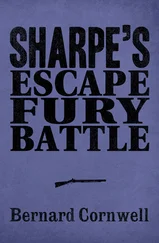Bernard Cornwell - Rebel
Здесь есть возможность читать онлайн «Bernard Cornwell - Rebel» — ознакомительный отрывок электронной книги совершенно бесплатно, а после прочтения отрывка купить полную версию. В некоторых случаях можно слушать аудио, скачать через торрент в формате fb2 и присутствует краткое содержание. Жанр: unrecognised, на английском языке. Описание произведения, (предисловие) а так же отзывы посетителей доступны на портале библиотеки ЛибКат.
- Название:Rebel
- Автор:
- Жанр:
- Год:неизвестен
- ISBN:нет данных
- Рейтинг книги:3 / 5. Голосов: 1
-
Избранное:Добавить в избранное
- Отзывы:
-
Ваша оценка:
- 60
- 1
- 2
- 3
- 4
- 5
Rebel: краткое содержание, описание и аннотация
Предлагаем к чтению аннотацию, описание, краткое содержание или предисловие (зависит от того, что написал сам автор книги «Rebel»). Если вы не нашли необходимую информацию о книге — напишите в комментариях, мы постараемся отыскать её.
Rebel — читать онлайн ознакомительный отрывок
Ниже представлен текст книги, разбитый по страницам. Система сохранения места последней прочитанной страницы, позволяет с удобством читать онлайн бесплатно книгу «Rebel», без необходимости каждый раз заново искать на чём Вы остановились. Поставьте закладку, и сможете в любой момент перейти на страницу, на которой закончили чтение.
Интервал:
Закладка:
Lee’s visit ended with an inconsequential exchange of views on how the war should be prosecuted. Faulconer vigorously pressed the necessity of capturing the city of Washington, while Lee talked of the urgent need to secure Virginia’s defenses, and afterward, with mutual assurances of goodwill, the two men parted. Washington Faulconer waited until the general had gone down the famous curved staircase, then exploded at Starbuck. ‘What chance do we have when fools like that are put in command? Dear God, Nate, but we need younger men, energetic men, hard-driving men, not washed-out, cautious buffoons!’ He paced the room vigorously, impotent to express the full measure of his frustration. ‘I knew the governor would try to kidnap the Legion! But he’ll need to send someone with sharper claws than that!’ He gestured scornfully toward the door through which Lee had left.
‘The newspapers say he’s the most admired soldier in America.’ Starbuck could not resist the observation.
‘Admired for what? Keeping his pants clean in Mexico? If there’s going to be war, Nate, it will not be a romp against an ill-armed pack of Mexicans! You heard him, Nate! “The paramount importance of keeping the Northern forces from attacking Richmond.”’ Faulconer gave a rather good imitation of the softspoken Lee, then savaged him with criticism. ‘Defending Richmond isn’t paramount! What’s paramount is winning the war. It means hitting them hard and soon. It means attack, attack, attack!’ He glanced at a side table where maps of the western part of Virginia lay beside a timetable of the Baltimore and Ohio Railroad. Despite his denial of planning to wage a private war on the North, Washington Faulconer was plotting an attack on the rail line that fed supplies and recruits from the western states to the city of Washington. His ideas for the raid were still forming, but he was imagining a small, fast force of mounted soldiers who would burn down trestles, derail locomotives and tear up track. ‘I hope the fool didn’t see those maps,’ he said in sudden worry.
‘I covered them with maps of Europe before General Lee arrived, sir,’ Starbuck said.
‘You’re a brisk one, Nate! Well done! Thank God I’ve got young men like you, and none of Lee’s dullards from West Point. Is that why we’re supposed to admire him? Because he was a good superintendent of West Point? And what does that make him? It makes him a schoolmaster!’ Faulconer’s scorn was palpable. ‘I know schoolmasters, Nate. My brother-in-law’s a schoolmaster and the man isn’t fit to be a cookhouse corporal, but he still insists I should make him an officer in the Legion. Never! Pecker is a fool! A cretin! A lunkhead! A heathen! A he-biddy. That’s what my brother-in-law is, Nate, a he-biddy!’
Something in Washington Faulconer’s energetic tirade triggered Starbuck’s memory of the amusing stories Adam liked to tell about his eccentric schoolmaster uncle. ‘He was Adam’s tutor, sir, yes?’
‘He tutored both Adam and Anna. Now he runs the country school, and Miriam wants me to make him a major.’ Miriam was Washington Faulconer’s wife, a woman who remained secluded in the country and suffered from a debilitating variety of mysterious maladies. ‘Make Pecker a major!’ Faulconer hooted with derisive laughter at the very idea. ‘My God, you wouldn’t put the pathetic fool in charge of a henhouse, let alone a regiment of fighting men! He’s a poor relation, Nate. That’s what Pecker is. A poor relation. Ah well, to work!’
There was plenty of work. The house was besieged by callers, some wanting monetary help to develop a secret weapon they swore would bring instant victory to the South, others seeking an officer’s appointment with the Legion. A good number of the latter were professional European soldiers on half pay from their own armies, but all such petitioners were told that the Faulconer Legion would elect only local men to be its company officers and that Faulconer’s appointed aides would all be Virginians too. ‘Except for you, Nate,’ Washington Faulconer told Starbuck, ‘that’s if you’d like to serve me?’
‘I’d be honored, sir.’ And Starbuck felt a warm rush of gratitude for the kindness and trust that Faulconer was showing him.
‘You won’t find it hard to fight against your own kind, Nate?’ Faulconer asked solicitously.
‘I feel more at home here, sir.’
‘And so you should. The South is the real America, Nate, not the North.’
Not ten minutes later Starbuck had to refuse an appointment to a scarred Austrian cavalry officer who claimed to have fought in a half-dozen hard battles in Northern Italy. The man, hearing that only Virginians would be allowed to command in the Legion, sarcastically inquired how he could reach Washington. ‘Because if no one will have me here, then by God I shall fight for the North!’
The beginning of May brought the news that Northern warships had begun a blockade of the Confederate coast. Jefferson Davis, the new president of the Provisional Government of the Confederate States of America, retaliated by signing a declaration of war against the United States, though the State of Virginia seemed in two minds about waging that war. State troops were withdrawn from Alexandria, a town just across the Potomac River from Washington, an act that Washington Faulconer scathingly condemned as typical of Letcher’s caviling timidity. ‘You know what the governor wants?’ he asked Nate.
‘To take the Legion from you, sir?’
‘He wants the North to invade Virginia, because that’ll ease him off the political fence without tearing his britches. He’s never been fervent for secession. He’s a trimmer, Nate, that’s his trouble, a trimmer.’ Yet the very next day brought news that Letcher, far from waiting supine while the North restored the Union, had ordered Virginian troops to occupy the town of Harper’s Ferry fifty miles upstream of Washington. The North had abandoned the town without a fight, leaving behind tons of gun-making equipment in the Federal arsenal. Richmond celebrated the news, though Washington Faulconer seemed rueful. He had cherished his idea of an attack on the Baltimore and Ohio Railroad whose track crossed the Potomac at Harper’s Ferry, but now, with the town and its bridge safe in Southern hands, there no longer seemed any need to raid the line farther west. The news of the river town’s occupation also promoted a flurry of speculation that the Confederacy was about to make a preemptive attack across the Potomac, and Faulconer, fearing that his rapidly growing Legion might be denied its proper place in such a victorious invasion, decided his place was at Faulconer Court House, where he could hasten the Legion’s training. ‘I’ll bring you out to Faulconer County as soon as I can,’ Faulconer promised Starbuck as he mounted his horse for the seventy-mile ride to his country estate. ‘Write to Adam for me, will you?’
‘I will, sir, of course.’
‘Tell him to come home.’ Faulconer raised a gloved hand in farewell, then released his tall black horse to the road. ‘Tell him to come home!’ he shouted as he went.
Starbuck dutifully wrote, addressing his letter to the church in Chicago that forwarded Adam’s mail. Adam, just like Starbuck, had abandoned his studies at Yale, but where Starbuck had done it for an obsession with a girl, Adam had gone to Chicago to join the Christian Peace Commission which, by prayer, tracts and witness had been trying to bring the two parts of America back into peaceful amity.
No answer came from Chicago, yet every post brought Starbuck new and urgent demands from Washington Faulconer. ‘How long will it take Shaffer’s to make officers’ uniforms?’ ‘Do we have a determination of officers’ insignia? This is important, Nate! Inquire at Mitchell and Tylers,’ ‘Visit Boyle and Gambles and ask about saber patterns,’ ‘In my bureau, third drawer down, is a revolver made by Le Mat, send it back with Nelson.’ Nelson was one of the two Negro servants who carried the letters between Richmond and Faulconer Court House. ‘The Colonel’s mighty anxious to collect his uniforms,’ Nelson confided to Starbuck. ‘The Colonel’ was Washington Faulconer, who had begun signing his letters ‘Colonel Faulconer,’ and Starbuck took good care to address Faulconer with the self-bestowed rank. The Colonel had ordered notepaper printed with the legend ‘The Faulconer Legion, Campaign Headquarters, Colonel Washington Faulconer, State of Virginia, Commanding,’ and Starbuck used the proof sheet to write the Colonel the happy news that his new uniforms were expected to be ready by Friday and promising he would have them sent out to Faulconer County immediately.
Читать дальшеИнтервал:
Закладка:
Похожие книги на «Rebel»
Представляем Вашему вниманию похожие книги на «Rebel» списком для выбора. Мы отобрали схожую по названию и смыслу литературу в надежде предоставить читателям больше вариантов отыскать новые, интересные, ещё непрочитанные произведения.
Обсуждение, отзывы о книге «Rebel» и просто собственные мнения читателей. Оставьте ваши комментарии, напишите, что Вы думаете о произведении, его смысле или главных героях. Укажите что конкретно понравилось, а что нет, и почему Вы так считаете.












